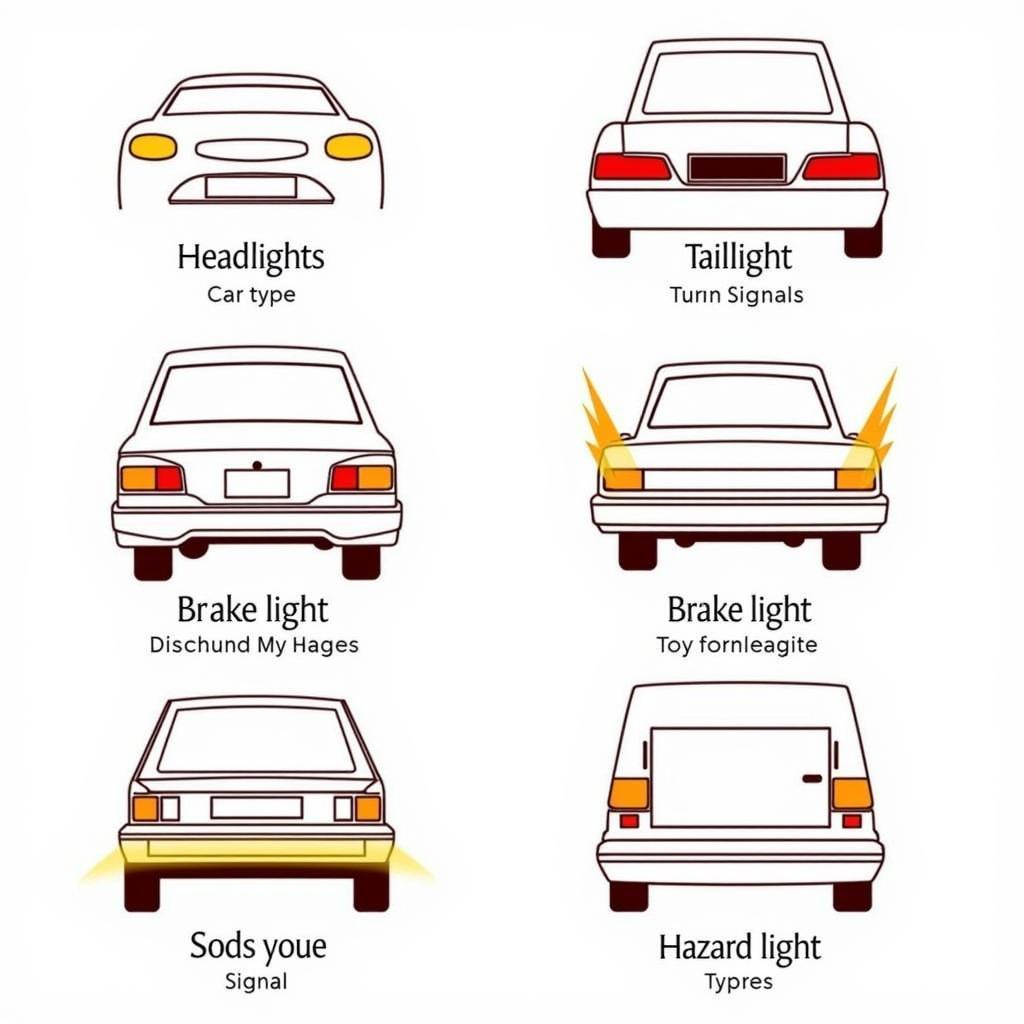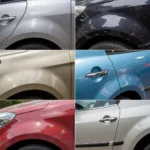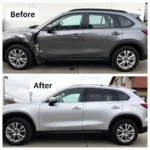Car lights are essential for safety and visibility while driving, especially at night or in adverse weather conditions. Malfunctioning lights not only put you and other drivers at risk but can also result in hefty fines. This guide provides a comprehensive overview of car light repair, helping you understand the importance of maintaining your vehicle’s lighting system and how to address common issues.
 Car Light Types and Their Functions
Car Light Types and Their Functions
Understanding the Importance of Functional Car Lights
Driving with faulty lights significantly reduces visibility, making it difficult to judge distances and anticipate potential hazards. This is particularly critical during nighttime driving when your vision is already compromised. Moreover, other drivers rely on your car lights to understand your intentions, such as braking, turning, or changing lanes.
Faulty car lights can lead to accidents and traffic violations. In most jurisdictions, driving with a broken headlight, taillight, or signal light is illegal and can result in fines or even license suspension.
Common Car Light Problems and Their Causes
Several issues can arise with car lights, ranging from simple bulb failures to more complex wiring problems. Understanding the root cause of the problem is crucial for effective repair.
Burnt-Out Bulbs
The most frequent culprit behind non-functional car lights is a burnt-out bulb. Like any other light bulb, car light bulbs have a limited lifespan and eventually need replacement.
Fused Circuits
A blown fuse can also cause car lights to stop working. Fuses protect the electrical system from power surges. If a circuit experiences a sudden overload, the corresponding fuse will blow, interrupting the flow of electricity to protect the connected components.
Wiring Issues
Over time, the wiring in your car can become corroded, damaged, or loose, leading to electrical problems that affect the car lights. Exposure to moisture, road salt, and extreme temperatures can accelerate wiring deterioration.
Faulty Switches and Relays
Car lights are controlled by switches and relays that can wear out or malfunction over time. A faulty switch or relay can interrupt the flow of electricity to the lights, causing them to fail.
Damaged Housings and Lenses
The housings and lenses that protect car lights can become cracked, fogged, or otherwise damaged, affecting the light output and visibility. Exposure to debris, UV rays, and temperature fluctuations can contribute to these issues.
Repairing Car Lights: DIY vs. Professional Help
While some car light repairs are simple enough to tackle yourself, others require specialized knowledge and tools best left to professionals.
DIY Car Light Repair
Replacing a burnt-out bulb is a relatively straightforward task that most car owners can handle with basic tools. However, it’s essential to consult your owner’s manual for the correct bulb type and replacement procedure specific to your vehicle model.
When to Seek Professional Help
For more complex issues, such as electrical problems, faulty switches, or damaged wiring, it’s best to seek professional help. Attempting to diagnose and repair these problems without proper knowledge and equipment can be dangerous and potentially cause further damage to your vehicle’s electrical system.
Tips for Maintaining Your Car Lights
Regular maintenance can extend the life of your car lights and prevent unexpected failures. Here are some tips to keep your lights in optimal condition:
- Regularly inspect your lights: Periodically check all your car lights, including headlights, taillights, brake lights, turn signals, and hazard lights, to ensure they’re functioning correctly.
- Clean your lights: Dirt, grime, and road debris can accumulate on the lenses of your car lights, reducing their effectiveness. Regularly clean your lights with a soft cloth and soapy water to maintain optimal light output.
- Avoid touching the bulbs directly: When replacing bulbs, avoid touching the glass part of the bulb with your bare hands, as this can leave residue that affects the bulb’s performance and lifespan.
how to repair car tail lights provides a more in-depth look at addressing specific issues with your tail lights.
Conclusion
Maintaining your car lights is crucial for your safety and the safety of others on the road. By understanding the importance of functional lights, common problems, and simple maintenance tips, you can ensure optimal visibility and avoid potential hazards. Remember, when in doubt about a repair, it’s always best to consult a qualified mechanic to ensure the job is done correctly and safely.
For a comprehensive guide on repairing car tail lights specifically, you can visit our dedicated article on repair car tail lights.
Frequently Asked Questions
Q: How often should I replace my car light bulbs?
A: Car light bulbs have varying lifespans depending on the type and usage. However, it’s generally recommended to replace them every 1-2 years or as soon as you notice dimming or flickering.
Q: Can I use any bulb to replace my car light bulbs?
A: No, it’s crucial to use the correct bulb type and wattage specified in your owner’s manual. Using the wrong bulb can affect light output, damage your vehicle’s electrical system, or even be illegal in some areas.
Q: Why is one of my headlights brighter than the other?
A: This could indicate that one of your headlights is burnt out or nearing the end of its lifespan. It’s essential to replace both headlights simultaneously to ensure balanced and optimal light output.
Q: What should I do if my car lights suddenly stop working?
A: If all your lights fail simultaneously, it’s most likely a blown fuse or a more serious electrical issue. It’s best to consult a qualified mechanic to diagnose and repair the problem.
Q: Can I repair a cracked headlight lens myself?
A: While DIY repair kits are available, it’s generally recommended to have a professional repair or replace a cracked headlight lens to ensure proper sealing and light output.
Need Help With Your Car Lights?
Contact us via WhatsApp at +1(641)206-8880 or email us at [email protected]. Our team of car repair experts is available 24/7 to answer your questions and provide assistance.


